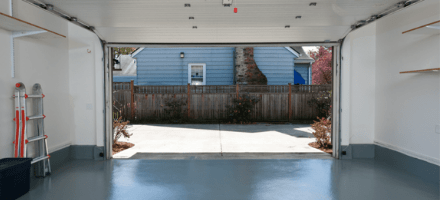Regardless of commercial industry or residential purposes, garage flooring needs can vastly differ from case to case. If you’re looking for a dependable, long-lasting coat, you rarely have to go very far, as many coating products boast similar qualities. But understanding what coating types to use, when to use them, and how best to install them may separate a decent floor coating project from an excellent one. Consider reviewing the following information before seeking your garage flooring product and accessories.
A Brief History of Floor Coatings
Epoxy: The history of epoxy dates to Switzerland in the first half of the 20th century. This synthetic coating is a result of curing. Curing is a process of chemicals and curing agents coming together to harden and create a bond to the surface on which the elements are applied. Epoxy floor coating is made by the process of combining polyamine hardener and epoxy resin.
Polyaspartic: Polyaspartic chemistry is a much newer form than that of epoxy, dating to the early 1990s. While these options can be more expensive than epoxy coatings, some find that their benefits—including little maintenance—outweigh the cost.
Urethane: Originally, polyurethane was used as a replacement for rubber during World War II. Following that era, its applications expanded into coating, adhesives, and rigid foams and it wasn’t long before it became commercially available. Today, in addition to floor coatings, you can find polyurethanes just about anywhere – footwear, appliances, cars, desks, and even clothes.
What Type of Coating Should I Use?
In many ways, the purpose of your garage will dictate what type of garage coating you should go with. Other factors like your outdoor environment, cost, and your goals for the flooring, of course, will also have their influence.
Epoxy
If you’re a contractor looking to coat a large commercial garage, you may want to go with epoxy, as it usually is resistant to heavier loads, lasts several years, and is relatively cost-efficient. The same may be true for individuals looking to coat a private mechanic’s garage floor, as these floors are likely to experience everyday use, regular friction, and exposure to potentially toxic liquids. Note, however, that if the temperature in your garage doesn’t adhere to manufacturer recommendations, your epoxy’s curing process may not take place as it should to create a sufficient bond.
Polyaspartic
For a garage floor job that requires bonding in extreme temperatures and a coating that is just as long-lasting and durable as epoxy coatings, look no further than polyaspartic coating. Take the Spartacote Flex PURE Clear Kit, for example. This floor coating can be cured at 35 degrees Fahrenheit, has serious stain resistance, and it is even green-friendly. What’s more, polyaspartic coats cure very fast, a highly beneficial quality for contractors or handymen that must move from one job to the next without compromising quality or performance.
Urethane or Polyurethane
Urethane coatings are known for having excellent color retention, a nice gloss, and great adhesion properties. They are also able to bond with flooring at low temperatures and are compliant with volatile organic compound standards. Products like the Key Resin #445 Sealer boast a fast curing time, low odors, and abrasion resistance. This coating will also offer great protection against chemicals and won’t fade or change color when exposed to sunlight.
Additional Features to Look for in Garage Floor Coating
Still wondering which route to take for your garage floor project? Other relevant features your coating may need include:
- Slip resistance
- Wear and tear
- Impact resistance
- UV resistance
- Installation difficulty
- Ability to mix with additives
Tips for Getting Started
If you’re a business owner and don’t have experience installing floor coatings, we recommend hiring a professional. That said, the first thing you will want to do is find the manufacturer’s instructions, warnings, and recommendations for application. A good rule of thumb is to adhere to the manufacturer labels even if Joe Schmoe down the road gave you his own tips on coating your floor. Then, perform due diligence by doing the following:
- Check the temperature in your garage: If you are applying epoxy, you will want a garage that is closer to room temperature.
- Clean your garage floor: This involves more than a simple sweeping. You may even need to check for excessive moisture or liquids that could interrupt your coating process. A dry, clean floor is best.
- Use good quality equipment: The equipment you choose to do the job can make a big difference in the overall performance of the coat.
- Avoid overstretching your coating: Make sure you have enough of your product for the job. Overstretching your coat may result in an uneven gloss or even blotchy, dull areas across your floor.
Of course, once your job is finished, you’ll want to maintain the quality of your newly coated floor for years to come. Be sure to invest in a dust mop with microfiber pads, a quality scrubber, and rejuvenating cleaner.
Protect Your Floor with Runyon Surface Prep
At Runyon Surface Prep, we’re dedicated to floor maintenance, concrete polishing, resinous flooring, and surface preparation. We believe in building relationships with our partnered businesses and contractors seeking assistance with products and installation. To learn more about our offerings, reach out today.
